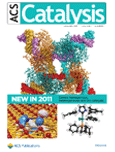
ACS Catalysis
Scope & Guideline
Connecting Chemists to Catalytic Breakthroughs
Introduction
Aims and Scopes
- Catalytic Mechanisms:
The journal emphasizes the detailed study of catalytic mechanisms at the molecular level, exploring how different catalysts facilitate chemical reactions and the factors that influence their efficiency. - Development of Novel Catalysts:
Research on the synthesis and characterization of new catalytic materials, including metal nanoparticles, metal-organic frameworks (MOFs), and organocatalysts, is a core focus area. - Electrocatalysis and Photocatalysis:
There is a significant emphasis on electrocatalytic and photocatalytic systems, particularly in the context of energy conversion and environmental applications, such as CO2 reduction and water splitting. - Biocatalysis and Enzyme Engineering:
The journal explores the use of enzymes and biocatalysts in synthetic chemistry, focusing on the engineering of these biological catalysts for improved efficiency and selectivity. - Sustainable Catalysis:
A growing area of interest includes the development of sustainable catalytic processes that minimize waste and utilize renewable resources, contributing to green chemistry. - Machine Learning and Computational Chemistry:
The integration of computational methods and machine learning techniques to predict and optimize catalytic activity and selectivity is increasingly prevalent in published research.
Trending and Emerging
- Single-Atom Catalysis:
Research on single-atom catalysts has gained significant traction due to their unique properties and potential for high efficiency in catalysis, particularly in energy-related reactions. - Sustainable and Green Catalysis:
There is a growing focus on developing catalysts and processes that are environmentally friendly, aiming to reduce waste and utilize renewable feedstocks. - Machine Learning and Artificial Intelligence in Catalysis:
The application of machine learning and AI for catalyst design, optimization, and predictive modeling is an emerging theme, driving innovation in catalytic research. - Electrocatalytic CO2 Reduction:
Research on electrocatalytic processes for CO2 reduction is rapidly expanding, driven by the need for sustainable carbon management and clean energy solutions. - Photocatalysis for Energy Conversion:
The field of photocatalysis, particularly for water splitting and CO2 reduction, is seeing increased interest as researchers explore new materials and mechanisms. - Biocatalysis and Enzyme Engineering:
The trend towards biocatalysis continues to grow, with an emphasis on engineering enzymes for improved performance in synthetic applications.
Declining or Waning
- Traditional Transition Metal Catalysis:
There has been a noticeable shift towards exploring non-traditional and sustainable catalytic systems, leading to a decrease in focus on classical transition metal catalysis. - Homogeneous Catalysis:
Research specifically centered on homogeneous catalytic processes has waned as attention shifts towards heterogeneous and hybrid catalytic systems that offer greater stability and recyclability. - Conventional Organometallic Catalysis:
The publication of studies primarily focused on traditional organometallic catalysts has decreased, as innovative approaches using single-atom and bimetallic catalysts gain popularity.
Similar Journals
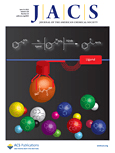
Journal of the American Chemical Society
Fostering Excellence in Chemistry for Over a CenturyJournal of the American Chemical Society (JACS), published by the American Chemical Society, stands as a pivotal publication in the field of chemistry, facilitating the dissemination of significant research findings since its inception in 1879. With an impressive impact factor and esteemed rankings placing it in the Q1 quartile across various categories—including Biochemistry, Catalysis, and Colloid and Surface Chemistry—JACS continues to serve as a vital resource for scientists, professionals, and students alike. Researchers choose JACS for its rigorous peer-review process, ensuring high-quality content that shapes the landscape of modern chemistry. The journal's extensive scope encompasses pivotal advancements and innovative methodologies, reflecting the evolving dynamics of chemical research. With access options being traditional subscription-based, it remains crucial for institutions and individuals to engage with its latest issues to stay at the forefront of chemical science advancement.

TOPICS IN CATALYSIS
Catalyzing Progress in Chemical SciencesTOPICS IN CATALYSIS is a renowned journal published by SPRINGER/PLENUM PUBLISHERS, dedicated to advancing the field of catalysis and its applications in chemistry and chemical engineering. With its ISSN 1022-5528 and E-ISSN 1572-9028, this journal has been a critical resource since its inception in 1994, encompassing a wide range of research topics and recent advancements within the realm of catalysis, including both fundamental studies and practical applications. As of 2023, it holds a prestigious Q3 ranking in Catalysis and a Q2 ranking in miscellaneous chemistry, reflecting its impact and relevance in the academic community. With a Scopus rank of #128 in General Chemistry and #38 in Catalysis, TOPICS IN CATALYSIS is positioned to be a key contributor to the ongoing dialogue in these fields, fostering innovation and collaboration. While not an open-access journal, it provides institutional access options, ensuring that the latest findings and methodologies are available to researchers, professionals, and students worldwide. This journal is essential for those looking to stay at the forefront of catalysis research and its transformative potential in science and industry.
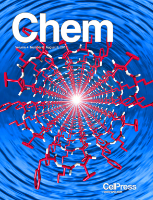
Chem
Leading the Charge in Open Access Chemical ResearchChem, published by CELL PRESS, is a renowned academic journal that has rapidly established itself as a leading platform for cutting-edge research in diverse areas such as biochemistry, chemical engineering, materials chemistry, and environmental chemistry. Released under the ISSN 2451-9294, this esteemed journal has achieved an impressive Q1 category ranking across multiple disciplines in 2023, highlighting its significant impact and prominence within the academic community. With a strong focus on innovative studies and interdisciplinary approaches, Chem fosters a vibrant dialogue among researchers, professionals, and students, making it an indispensable resource for those seeking to advance their knowledge and contribute to the evolving field of chemistry. As an open access journal, it aims to democratize knowledge, ensuring that critical research is accessible to a global audience. With its headquarters based in Cambridge, MA, it continues to lead the charge in the dissemination of pivotal findings that shape our understanding of chemical sciences.

CCS Chemistry
Advancing Chemistry Through Open Access InnovationCCS Chemistry, published by the esteemed Chinese Chemical Society, is a leading open-access journal dedicated to advancing the field of chemistry. Since its inception in 2019, the journal has rapidly gained recognition, achieving a remarkable impact factor that places it in the prestigious Q1 category in Chemistry (Miscellaneous) as of 2023. With a Scopus ranking of #41 out of 408 in General Chemistry, CCS Chemistry represents the top 10th percentile in its category, reflecting its commitment to high-quality research and innovation. The journal serves as a vital platform for researchers and professionals to share their findings, showcase cutting-edge methodologies, and engage with the latest developments in various chemistry subfields. Accessible to a global audience, CCS Chemistry ensures that groundbreaking research is available without barriers, making it an indispensable resource for students and academics aiming to stay at the forefront of chemical sciences. For further details, submissions, and access to published articles, please visit the journal's website.
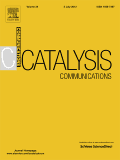
CATALYSIS COMMUNICATIONS
Innovating Tomorrow's Chemical Solutions TodayCATALYSIS COMMUNICATIONS is a prestigious journal published by Elsevier, focusing on advancements in the field of catalysis, an essential component of chemical engineering and process technology. With an ISSN of 1566-7367 and an E-ISSN of 1873-3905, this journal is dedicated to the rapid publication of original research and innovative findings that drive progress in catalysis. Recognized for its quality, CATALYSIS COMMUNICATIONS holds a Q2 ranking within the categories of Catalysis, Chemistry (miscellaneous), and Process Chemistry and Technology as of 2023, positioning itself in the upper tier of scholarly publications in its field. The journal has made significant contributions to the scientific community since its inception in 2000, with ongoing research until 2024. While it currently operates without an open-access option, the platform ensures rigorous peer review, maintaining high standards for publication. By engaging with the latest research, CATALYSIS COMMUNICATIONS serves as a vital resource for researchers, professionals, and students, fostering innovation and collaboration in chemical sciences.
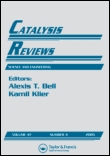
CATALYSIS REVIEWS-SCIENCE AND ENGINEERING
Navigating the Frontiers of Catalytic ScienceCATALYSIS REVIEWS - SCIENCE AND ENGINEERING, published by Taylor & Francis Inc, is a leading journal in the field of catalysis, providing a vital platform for the dissemination of rigorous research and comprehensive reviews from 1968 to the present. With an impressive Q1 ranking in multiple categories, including Catalysis and Chemistry, this journal stands out as an essential resource for professionals, researchers, and students alike. Its high impact factor and esteemed Scopus ranks — including 3rd in Chemical Engineering: Process Chemistry and Technology — highlight the journal's influence and prestige within the scientific community. While primarily a subscription-based publication, the journal’s commitment to advancing the understanding of catalytic processes continues to foster innovation in various industrial applications, making it indispensable for anyone engaged in the fields of chemical engineering and applied chemistry.
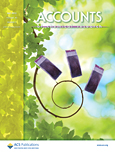
ACCOUNTS OF CHEMICAL RESEARCH
Transforming Research into Real-World SolutionsACCOUNTS OF CHEMICAL RESEARCH, published by the American Chemical Society, is a premier journal dedicated to advancing the field of chemistry and its applications in medicine. With an impressive impact factor and recognition as a Q1 journal in both chemistry and medicine categories, it ranks among the top-tier publications, exhibiting an outstanding Scopus rank of 8 out of 408 in general chemistry, placing it in the 98th percentile. This journal has been a vital source of innovative and significant research since its inception in 1968, and it aims to provide a platform for high-quality research articles, reviews, and critical essays that bridge the gap between chemical research and clinical implications. While it is not an open-access publication, the insights available in Accounts of Chemical Research are invaluable for researchers, professionals, and students seeking to explore the latest developments and interdisciplinary approaches within the dynamic fields of chemistry and medicine.
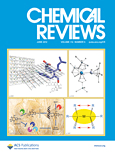
CHEMICAL REVIEWS
Your Gateway to Comprehensive Chemical Insights.Chemical Reviews, published by the American Chemical Society, is a leading journal in the field of chemistry, renowned for its comprehensive and authoritative reviews on a wide range of chemical topics. With its ISSN 0009-2665 and E-ISSN 1520-6890, this prestigious journal has maintained a remarkable trajectory since its inception in 1924, continuously contributing to advancements in the chemical sciences. As a Q1 journal in the Chemistry (miscellaneous) category, it stands at the forefront of research, boasting an impressive Scopus rank of #1 out of 408 in the field of General Chemistry, positioning it within the top 1% of the field. Chemical Reviews offers invaluable insights and serves as a critical resource for researchers, professionals, and students alike, facilitating knowledge exchange and fostering innovation in chemistry. While currently not open access, it remains a vital component of the scientific community, gathering an extensive readership base eager for the latest developments, methodologies, and theoretical frameworks in this dynamic discipline.

Trends in Chemistry
Advancing Knowledge, Shaping TrendsTrends in Chemistry, published by CELL PRESS, stands at the forefront of the multidisciplinary field of chemistry, offering cutting-edge research and insights that shape contemporary scientific discourse. With its impressive rank of #12 out of 408 in the General Chemistry category of Scopus—placing it in the 97th percentile—this journal represents the pinnacle of academic excellence and innovation. Since its inception in 2019, it has provided a platform for sharing pivotal developments and trends in the chemical sciences, making it an invaluable resource for researchers, professionals, and students alike. Although it operates under subscription access, Trends in Chemistry is dedicated to expanding the frontiers of knowledge and fostering a vibrant academic community. Its Q1 quartile ranking underscores its significance and authority in the field, ensuring that it remains an essential reference point for anyone engaged in the ever-evolving world of chemistry. With its impactful contributions, Trends in Chemistry not only reflects current advancements but also drives future innovation in the discipline.
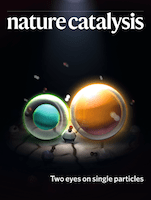
Nature Catalysis
Innovating the Future of Catalysis and Process TechnologyNature Catalysis is a premier academic journal published by NATURE PORTFOLIO, specializing in the rapidly evolving fields of biochemistry, bioengineering, and catalysis. With its ISSN of 2520-1158, this journal has emerged as an invaluable resource since its inception in 2018, contributing significantly to interdisciplinary research. Recognized for its high impact within the scientific community, it holds a prestigious Q1 ranking across multiple categories, including Biochemistry, Process Chemistry and Technology, and Catalysis as of 2023, illustrating its influence and authority in the field. Researchers will find impactful articles characterized by rigorous peer review processes that push the boundaries of knowledge in catalysis and its applications. While the journal operates with traditional access models, it remains accessible to a global audience interested in innovative research findings that promise to shape future developments in these critical areas. Positioned at the forefront of contemporary scientific inquiry, Nature Catalysis invites contributions that expand upon catalytic processes and technologies, which are crucial for advancing both fundamental science and applied engineering.